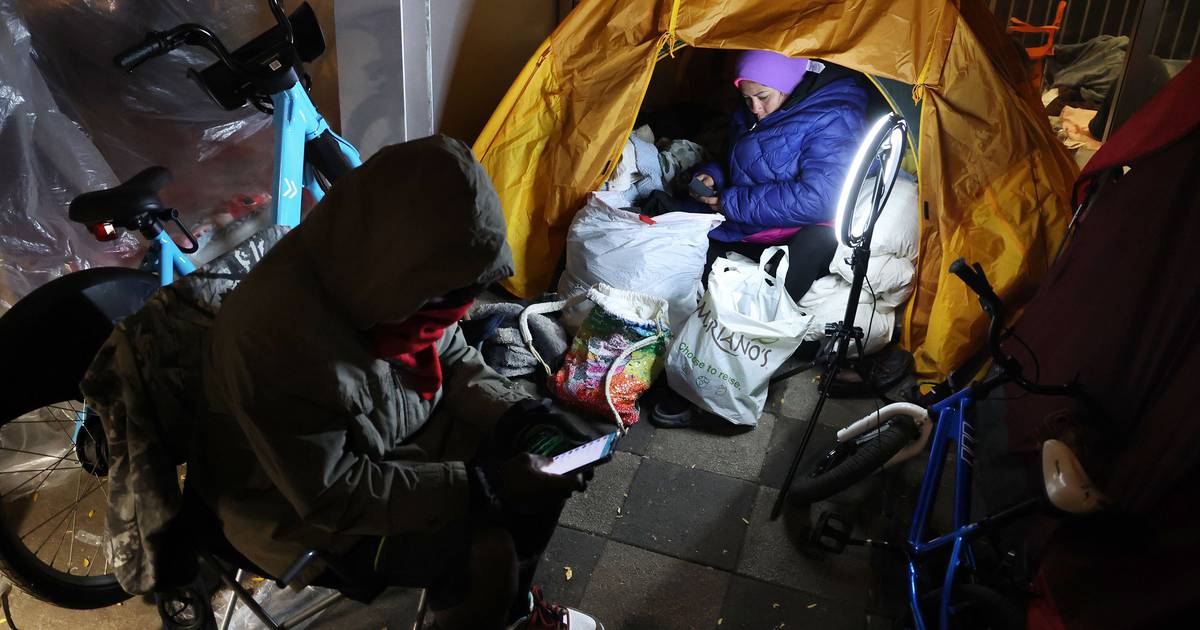Chicago woke up on Halloween to below freezing temperatures and snow flurries. All day long, the wind whipped and flakes flew and parents debated the wisdom of trick-or-treating. At one point it hailed.
And thousands of new arrivals to Chicago — migrants bused here from the U.S. border — remained without warm shelter or even, in many cases, coats.
“On Monday night, as the temperature began to fall at the 1st District police station on the Near South Side, children with pink noses and eyes teary from the wind shivered as they ran around without shoes; some without sweaters,” the Chicago Tribune’s Laura Rodríguez Presa and Nell Salzman reported. “Parents prepared tents by tying layers of black plastic bags or a tarp over them.”
More than 50,000 migrants have been bused from Texas to major U.S. cities — New York, Chicago, Denver, Philadelphia, Boston — since April 2022. More than 13,500 men, women and children have arrived in Chicago so far, according to Axios, on 290 buses. More arrive daily. A majority are from Venezuela, where the coldest month, January, averages 75 degrees.
“Now this is truly a crisis,” Erika Villegas, a lead volunteer at the 8th District in Chicago Lawn, told Rodríguez Presa and Salzman.
It would be disingenuous to pretend there is an easy solution — or a series of easy solutions — to this crisis.
“With each new shelter consideration,” the Tribune reports, “Mayor Brandon Johnson’s office receives major pushback from aldermen and residents, as well as resistance to his controversial plan to erect heated base camps to protect migrants from the fast-approaching winter.”
It would be inhumane to give up trying.
The United States is the richest country in the world. The issues that lie at the heart of this crisis lie at the heart of so many of our cities’ and our nation’s crises — housing, in particular. Searching for ways to make life safer and warmer and healthier for these new arrivals, immediately and long-term, doesn’t distract from our other problems. It gets us closer to solving them.
It would be un-American to give up trying.
We are a nation of immigrants. Our ancestors arrived here — those who came willingly — in search of better, richer, healthier, freer, safer, happier lives. We celebrate and honor that search with parades and holidays and statues, including one that stands 305 feet tall on Liberty Island.
We are defined by that and better for that.
“However you feel about anything,” Pete Les, a volunteer from Jesus Chicago church told the Tribune, “these are souls and they’re humans.”
And more of those humans will continue arriving on buses, with no coats and no homes and no ability to obtain work permits quickly. And winter is descending.
And as we debate what to do and how to help — at City Hall, at community meetings, inside our homes and our workplaces and our houses of worship and our own minds — we may want to frame our thinking around philosopher John Rawls’ veil of ignorance theory, which invites us to design society’s rules and structures and systems with no idea what our own circumstances or status will be within that society. What would we put in place, what would we want access to, what would we ensure, if we didn’t know whether our own children would be born into wealth or poverty, peace or war, abundance or scarcity?
And then we may want to proceed — volunteer, donate, debate, vote — accordingly.
I’ve shared the following anecdote in this space before, but I think it bears repeating here.
It’s about Abraham Johannes Muste, a Dutch-born activist who spent most of his life in the United States. He was an ordained minister and an author. He agitated for the labor movement and was active in the religious pacifist movement. He died in 1967.
I first saw this particular anecdote on Facebook, but I’ve since found multiple other references to it. It goes like this:
Muste was standing outside the White House holding a candle during the Vietnam War, which he did night after night in quiet protest of the conflict. He was approached by a reporter, who is said to have asked Muste, “Do you really think you are going to change the policies of this country by standing out here alone at night in front of the White House with a candle?”
And Muste is said to have replied, “Oh, I don’t do this to change the country. I do this so the country won’t change me.”
The enormity and seeming intractability of this crisis can’t paralyze us into inaction or, worse, cynicism. Winter is coming. Lives are on the line, and so is our humanity.
Join the Heidi Stevens Balancing Act Facebook group, where she continues the conversation around her columns and hosts occasional live chats.
Twitter @heidistevens13


